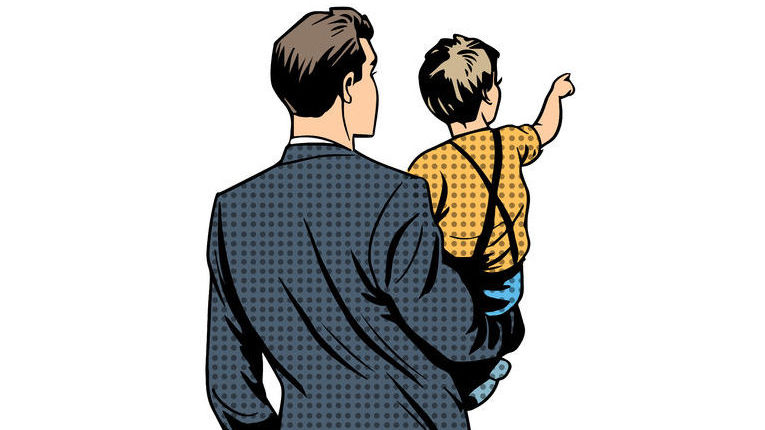Like many people, I spent much of my life believing my father was immortal. Then he told me a story that changed that.
When dad was diagnosed with cancer, I knew he was going to beat it. The whole family did. I was worried, of course, and I learned enough about his cancer to realize we couldn’t take it lightly. But my heart and most of my mind were confident he’d overcome it. He was in his 60s. I was in my 40s.
For two years it went well. He had a few rounds of chemo that shrank the tumors and kept him strong and healthy. He continued working as a math professor. He talked about the future. There were places he wanted to travel, and he looked forward to his grandchildren’s milestones. He bought a new car.
Then the cancer roared up like a flame with new fuel. Dad went through an especially aggressive regime of chemotherapy. It left him on his back, gasping and bleeding from his mouth. But it didn’t slow the cancer. Still, we believed he would overcome.
One night, my family went to my parents’ house for dinner after Dad had recovered from that chemo. He looked well, almost back to normal. My faith in a positive outcome grew as we ate and talked.
Then after dinner, Dad cornered me in the kitchen. Nobody else was around. He grabbed me by both shoulders. That wasn’t like him at all. His hands trembled.
“I’m worried about Mom,” he said, his eyes drilling into me. “She really can’t take care of herself. Last night her sleeve caught fire at the stove. I was there, so she wasn’t hurt. But you know how she is. . . .”
He didn’t finish the thought. He let it play out in my imagination. We faced each other in silence for probably a minute.
My mother had a chronic illness. All her life she had an impulsive approach that mostly served her well. But it was becoming dangerous. Dad had been quietly taking on the increasing burden of her care: driving her to appointments, making sure she took her medications, keeping her from falling, from getting lost, from setting herself afire.
It suddenly hit me—hit me almost with physical force—that my optimistic belief about his cancer was out of step with reality. At that instant, I realized that the cancer might take him, and leave my mother to my care.
That was the moment my father became mortal.
All he’d done was paint a quick verbal sketch: my mother, standing at the stove, flames licking up her sleeve, unaware as it climbed her arm. It was as vivid as a movie.
Until then, I’d understood the risk with my head but hadn’t felt it in my gut, or taken it seriously enough to prepare for a future without him. Now I was charged with energy to respond.
That’s the power of story. It can flip the switch in our heads from a vague fact to an unavoidable reality.
My father’s story—the last story he ever told me—was barely a story at all. But it was utterly vivid and heavy with urgency. I began to prepare for life without my father. He died a month later, and I became my mother’s caregiver.
I hope I never tell a story that hurts a donor as much as that story stung. But I do hope to tell stories that deliver as much motivating truth.
My experience is in no way unusual. We all live parts of our lives hiding behind a curtain. Maybe it’s the health of a loved one. Or our own financial situation. Or the appalling fact that children are going hungry. Or that diseases like cancer carry off people far too soon.
We know the facts. We can calculate the statistics. But we know them with our heads, not our hearts. That’s how your cause is for most donors. They’ve been exposed to the facts, probably for decades. You can shovel more and more facts about your issue at them, but you won’t change a thing in their brains, their will, or their muscle to pick up a pen and write a check.
Not until you lift the curtain by telling a story. Until then, they won’t give.
(Excerpted from How to Turn Your Words into Money by Jeff Brooks.)
For more tips like this on how to use storytelling to connect with your donors, join Jeff on his storytelling course, Your Blueprint for Donor-Focused, High-Revenue Fundraising Storytelling that is available for all members of The Fundraisingology Lab.











4 Comments. Leave new
This was the first thing I read this morning while sipping coffee and will serve as my inspiration for the day! Great story, Jeff. Thanks for sharing it.
Wow! That hits home right now. Thank you for sharing this story.
I didn’t have to face the eventual loss of my parents. They passed away when I was very young. It reminded me that I had better get things in order for my children. And the power of storytelling in fundraising that I need to instill in my staff members.
Jeff, what a tender story about the people who you hold so dear. I can almost feel that wave of reality sweeping over you. Thank you for your generosity in sharing that moment.
I appreciate that you want to tell donors stories that make the theoretical real, without knocking them off their feet. I work at a hospice and am always trying to find more stories about the ‘moments’, rather than the programs. Your story was a great reminder of the impact that a moment can have.